July 1918
Allies seize the offensive on the Western Front
July 5
Allies Await Renewal Of German Offensive
Tension is increasing along the Western front in France as the crescendo of the German artillery fire increases. From Ypres to Rheims the big guns are busier than they have been for some days, and the Germans probably are preparing to react strongly against the Allied nibbling tactics, which cost them important points last
week.
Both the French and the British continued operations and recently adopted a program of attacking the Germans at various points along the Franco-Belgian line, capturing a vantage point here and there to hamper the enemy while the preparations for the resumption of his offensive are underway.
The German command is known to have large forces ready on the main battlefields of France. They may strike anywhere on the 200-mile main front. It is expected also that the blow, when and where it does come, will be the mightiest the enemy can make.
The puzzling pause of the enemy offensive is believed to be because he is awaiting the arrival of a new type of gun, between the extreme long-range guns with which she has been shelling Paris, and long-range naval guns.
American Troops Capture Vaux
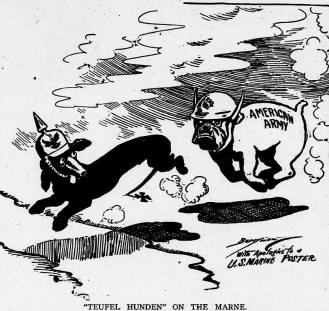 In a brilliant operation, American troops Monday night captured the village of Vaux, together with a large slice of the Paris highway west of Château Thierry. The Americans took
275 German prisoners, including five officers, and captured a quantity of machine guns and other equipment.
In a brilliant operation, American troops Monday night captured the village of Vaux, together with a large slice of the Paris highway west of Château Thierry. The Americans took
275 German prisoners, including five officers, and captured a quantity of machine guns and other equipment.
The Americans took the Germans completely by surprise. Most of the prisoners were taken out of cellars and dugouts. The number of Germans who were killed is unknown, but from the number of dead in plain view at various places, the total must have been considerable.
It was exactly six o'clock on Monday evening when the Americans went over the top under the protection of a hail of machine gun bullets. A short but terrific artillery preparation preceded the infantry action. When the Germans saw that a formal attack was developing, many of those in outpost yelled and ran towards the rear,
away from where the hot fire was pouring.
While the artillery preparation was going on, many American airplanes flew high overhead. Some were protecting the observation balloons, while others were checking the skies to keep off enemy machines.
The Americans paused for a moment while the machine guns fought a duel in front of Vaux with the enemy. Then the Americans, the number of whom was considerable, went on, most of them running in her eagerness to get at close quarters with the Germans. At the same time, the Germans began hurling gas shells to the rear of the
American lines.
Daylight on Tuesday morning saw the Americans digging in, undisturbed far beyond the old German defensive lines. The German prisoners and piles of materials are going to the rear. The American pilots appeared and were soon found contesting for the supremacy of the air with the enemy. A number of aerial battles were observed,
but reports on the results are not yet available.
On Wednesday, enemy artillery fired on the American lines. The crash of exploding shells swirled to a roar, while the ground and air throbbed with the concussions of shells. But the American guns answered the German shells shot for shot. American gunners, stripped to the waist, stood in the gun emplacements, feeding shells as
fast as they could handle them into the guns, and a steady stream of steel explosives swept towards the enemy lines.
On Thursday, a heavy German counterattack against the American positions was launched but was repulsed with heavy German losses. Not a foot of the ground won by the Americans in their attacks on Monday night was lost.
The counterattack developed after the Germans heavily bombarded the American positions, when the German infantry leaped from the trenches the troops came over in close formation. In some cases, whole companies were allowed to approach close to the American lines, then the American machine gunners, from their hidden nests, let
loose a perfect hail of bullets mowing down the enemy ranks and piling the dead all over the ground.
The American artillery lent efficient aid, completely breaking up the enemy attack, which was launched with fresh regiments of storm troops. At last report the American machine gunners were holding their ground and repulsing Germans’ small but desperate efforts to retake the ground wrested from them. The Americans are reported
to be well protected by their temporary trenches and are not exposing themselves needlessly to the storm of flying steel from the bursting German shells.
The German losses are unknown, but prisoners say that their orders were to drive back the Americans at all costs.
July 12
New Blows By Huns About To Be Struck
Germany's offensive, begun on March 21, is not completed, and the Germans have yet to win a strategically vital point. Another strong effort, probably greater than any this year, has been awaited by the Allies for several weeks. Gen. Foch has employed the past weeks successfully by improving his positions at various points
along the main front.
The lull of the past few days will not continue long and it is not improbable that the Germans will break it by hurling their masses against the Allied lines to crush it, if possible. The Germans have had much time in which to prepare for further great strikes and it is known that they have from 30 to 40 divisions in shape to
throw into the fray. In addition, the Germans have not been very active for more than a week and their counterattacks have not been carried out with the usual strains and determinations.
Naturally, the main interest of the day was the American soldiers who made their initial appearance in the battle line and who fought so fiercely that they established an enviable reputation and drew the prediction that they would be second to none among hardy warriors.
Meanwhile, a new offensive is expected on the Italian front. Gen. Ludendorff has visited the Austrian headquarters and has hastened preparation for another blow against the Italians. Considerable reinforcements are being concentrated on the Italian front.
Germany will send three Army Corps to the aid of the Austrians. These will be placed under the direct orders of the German Commander-in-Chief on the Italian front and will be assigned to the Alps sector. The Austrian railroad has been placed under German control and will be used exclusively for the movement of German troops.
Unknown Fever Strikes German Troops
It is reported that a fever of unknown origins is now rampant in the German Army. An un-posted letter found in the pocket of a man captured July 4 read: "I feel so ill that I should like to report sick. Fever is rampant among us, and already a whole lot of men are in the hospital. Every day more go in. As I have not yet had
leave and am expecting to go any day I shall not report sick yet."
The new fever was said to strike down men so quickly that they dropped in their tracks while on duty. They have high fevers for two or three days and are usually laid up at the hospital for six days. Reports indicate that the fatality rate from the fever is surprising even the German doctors.
Germany Discounts U.S. Troop Figures
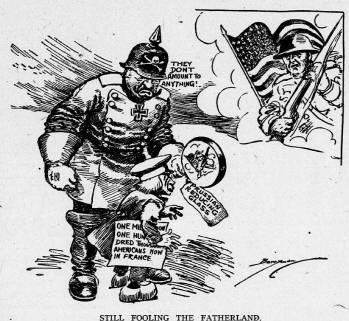 Newspapers in Germany have published the figures recently given out by Secretary of War Baker as to the number of Americans sent overseas, but heretofore they have practically refrained from making comment on the subject apart from sarcastic
captions like the "American Bluff."
Newspapers in Germany have published the figures recently given out by Secretary of War Baker as to the number of Americans sent overseas, but heretofore they have practically refrained from making comment on the subject apart from sarcastic
captions like the "American Bluff."
The only military expert heard so far is that of Lieut. Gen. Von Ardenne, who, in a long article Tuesday, comforts his German readers with stale arguments to the effect that "he does not believe those figures and that numbers do not count anyways."
He says: "President Wilson recently announced that two million men were under arms, in fact, only two or three divisions so far have made their presence felt. The rest have been occupied in building rural roads, factories and ammunition depots. It is, however, no matter of quantity, but of quality. The American Army operates
under far less favorable conditions regarding its equipment and armament, proof of this being seen in the drilling of her recruits without rifles."
"American troops have been mixed with French and English units, as was shown by the repeated attacks in the past two weeks. The Allies simply don’t trust the American troops and are afraid they will run away as soon as the first shots are fired. One million soldiers need 4,000,000 tons of supplies. That these are unavailable
shows the effectiveness of our U-boat war. America cannot send a useful force inside of two or three years. By that time, we will have won the war."
July 19
Huns Launch Great Attack
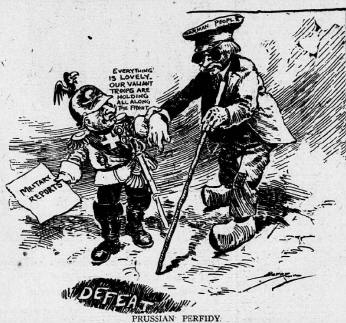 After a wait of 33 days since they were halted in their plunge towards Paris, the Germans, at dawn on Monday, launched a new phase of their mighty offensive by attacking over a front of 65 miles. Latest reports from the battlefield stated
that the Germans have crossed the Marne at several places.
After a wait of 33 days since they were halted in their plunge towards Paris, the Germans, at dawn on Monday, launched a new phase of their mighty offensive by attacking over a front of 65 miles. Latest reports from the battlefield stated
that the Germans have crossed the Marne at several places.
On Sunday night, artillery fire was loosened against the Allied lines. For hours the Allied lines were under a tempest of the most tremendous character. For the renewal of their drive the Germans have selected the road to Paris, which was somewhat of a surprise to military experts who believed that the Germans would seek to
make the channel the object of their new offensive.
The Allied resistance to the Germans and the present offensive have been so great, and the German losses consequently so numerous, that the Germans were forced to employ the divisions they had not intended to utilize until the following day. The Imperial Gen. staff left no stone unturned to gain a decisive success and 30 to 35
divisions have been put into the line. That is about one division to two miles. The enemy's losses were considerable.
According to Allied reports, the first day of the offensive was a big defeat for the enemy. The enemy was not able to break through the Allied positions on the entire attacking front. The slight advances made by the enemy are insignificant in comparison to the efforts displayed and the losses sustained. The general impression
is that confidence reigns within the Allied lines. Hundreds of Germans, dead, line French roads and woods, and then the smashed tanks, which the enemy used to support the infantry, are littered among the dead. To sum it up, the first phase of the operation was perfectly satisfactory for the Allies.
With the fifth German drive virtually halted, the fighting is resolving itself into a series of local engagements. More optimistic military observers here are already considering the possibility of a counter allied offensive on a major scale.
Some hold that if the Allied line to the south remains firm with its present strength without calling for reinforcements, a successful counter drive in Flanders is within the range of possibility.
They believe that gains by the Allies in the north, following the failure of the Austrian effort, and the repulse of the German stroke towards Paris, would have tremendous effects on the morale of the German Army and the German people.
Allies Begin Counterattack
Yesterday, the Allies finally began to counterattack in an organized fashion. The enemy was taken completely by surprise all along the line. The American troops were brought up in the night together with their French comrades and lay in their positions until five o'clock in morning. At that hour the Allied artillery opened
fire.
The Allies advanced beyond their first objective in less than half an hour. The Germans in most places offered feeble resistance, but here and there they put up a stubborn fight, which the American shock units quickly overcame at the point of the bayonet and the muscles of their weapons.
The announcement that the French have taken the offensive is the most encouraging word that has come from any Western conflict in the present year. What it means beyond all else is that the first phase of the German offensive has proven a failure and that the Allies, assured of the security of their main front, had been able
to launch a counter thrust designed to relieve the one in-peril position – the Rheims salient.
The possibility of this latest development cannot be exaggerated. The pressure upon the western flank of the Germans operating in the Rheims salient will compel them to give over their attack. It is becoming clear that the French and the Americans have made a substantial breach in the first line of the German defenses and are
advancing upon the lines of communication essential to the safety of the German troops who are past the Marne.
As it now stands, on the fourth day of the fifth German offensive, the force of the German effort has been completely checked east of the Rheims, with no material gains. The next few hours should be decisive. A gain of eight or ten miles would not only deprive the Germans of all profits in their present offensive, but compel
them to surrender the larger part of their gains from the attacks in May.
Americans Celebrate Bastille Day
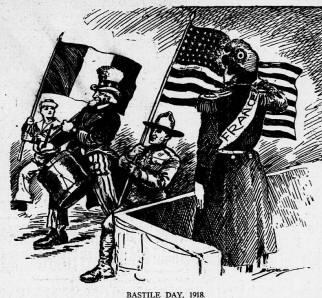 At the order of President Wilson, the French flag is to be displayed over all public buildings and ships at home and abroad on Bastille Day. The White House plans to recognize the day by flying the national ensign of France besides the stars and
stripes.
At the order of President Wilson, the French flag is to be displayed over all public buildings and ships at home and abroad on Bastille Day. The White House plans to recognize the day by flying the national ensign of France besides the stars and
stripes.
On Saturday the President sent the following message to the president of France:
"America greets friends on this day of stirring memories with a heart full of warm friendship and a devotion to the great cause in which the two people are now so happily united. July 14, like our own July 4, has taken on a new significance, not only for France, but also for the world. As France celebrates our Fourth of
July, so do we celebrate her 14th.
"France is so close a neighbor to our hearts. The war is being fought to save ourselves from intolerable things, but it is also being fought to save mankind. We extend our hands to each other, to the great people with whom we are associated, and to the people everywhere who love right and price justice as a thing beyond
price, and consecrate ourselves once more to the noble enterprise of peace and justice, realizing the great conceptions that have lifted France and America high among the free peoples of the world."
July 26
Allies Continue Counterattack
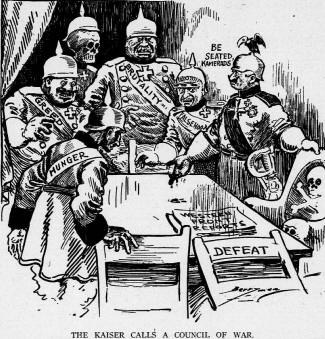 The French and American forces are continuing the steady pounding of the northern part of their line, although the movement is lacking the dashing events that characterized the first days of the attack.
The French and American forces are continuing the steady pounding of the northern part of their line, although the movement is lacking the dashing events that characterized the first days of the attack.
With the subsidence of the German drive last week and the counter smashing blows administered by the French and the American troops, the high watermark of German offensive on the Western front has been reached. The initiative has passed to the Allied Armies.
The Germans, violently attacked on the right flank and south of the Marne, have been compelled to retreat and re-cross the river. The French now hold the entire southern bank of the Marne.
Unofficial reports make it appear that not only are the Allies rapidly continuing the process of pushing the Germans from their Marne salient, but that a movement may be in the process of execution by means of which it is hoped to trap a goodly section of the German Crown Prince's Army. Driving in on the west, the French are
now reported to reach a point within three miles of railroad junction, over which the Germans move troops and supplies, converge.
On the eastern side of the salient, British troops have driven a great distance and are now on the outskirts of the main German base south of the Aisne. The base lies about midway from the top of the pocket in which half a million Germans are massed.
If the Allied nutcracker continues to close in, then Germans will be fortunate if they can extract all their forces from the Marne salient. Their railroad communications are virtually all under heavy fire. The tired and defeated Germans must retreat over wagon roads and the task of bringing them out safely is a heavy one.
Continued Allied success would compel the German retreat at least as far as the Ysale River.
The attempts of the Crown Prince's generals to rally their forces to meet the steady movement of the Allies has resulted in such strengthening of the opposition as to indicate that the battle is approaching the point where the Allies will soon be locked in a giant struggle. Both on the northern end of the line and in the far
south the Germans are making a desperate effort to hold their positions.
The enemy's main energy seemed to be concentrated on defensive fighting in a series of desperate rearguard actions and the effort to extract the bulk of their forces from the clutch of the Allies. The position of the enemy is held to be critical in view of the relentless pressure maintained by the Allies, whose tactics may
still turn the enemy retreat into a rout.
In spite of the desperate resistance of the Germans, the entry into the lines of the enemy’s reinforcements and repeated counterattacks, the flow of the Allies’ victory continues to develop. Not only have the Allied positions been held intact against the enemy's assaults, but also at certain points further progress has been
made.
Military critics are unanimous in saying that Gen. Ludendorff's focus is to protect the retreat for the Army along the Marne. Indications are that the enemy is destroying stores that cannot be moved back of the German defensive lines.
Germans offer peace terms
Germany has made suggestions for a peace conference to the Spanish government. The German terms are:
First, Germany wants no annexation in the West. Second, the peace treaties with the Russians and Romanians may not be questioned. Third, the principle of self-determination of peoples has not been discussed, but may be settled at the peace conference, where the fate of Belgium also is to be settled. Fourth, the Balkan question
is to be settled around the conference table. Fifth, the freedom of the seas, the dismantling of Gibraltar and the Suez Canal, and the right for Germany to use coaling stations. Sixth, the colonial question is to be settled on the basis of the status quo.
Officials in Washington declined to discuss the Germans’ peace terms, but indicated strongly that should the reported terms be verified, they would receive scant consideration. Promulgation of the suggestions at this time, and their tenure, surprised officials here because the proposals have already been deemed impossible as a
basis of negotiations, and they come at a time when, from the military reverses of the German command, Germany's diplomats might have been expected to relax somewhat her proposals.
It was thought possible that the suggestions were framed before the recent operations of the Allies, in anticipation of the success of the German drive, which was nipped in the bud by the Allied counteroffensive.
These suggestions from Germany still fall on empty ears because of the obvious insincerity of the terms proposed, which, in the opinion of the Department of State officials, are unthinkable.
Read past editions of News Reports From the Front